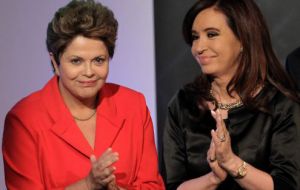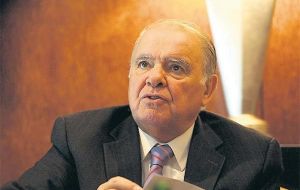MercoPress. South Atlantic News Agency
Too many summits: Ibero-American countries decide to meet every other year
 Brazil's Rousseff; Venezuela's Maduro and Cristina Fernandez among others were absent from the gathering
Brazil's Rousseff; Venezuela's Maduro and Cristina Fernandez among others were absent from the gathering  The Panama meeting also was the farewell for Secretary Enrique Iglesias who has held the post for eight years
The Panama meeting also was the farewell for Secretary Enrique Iglesias who has held the post for eight years In a poorly attended Ibero-American summit held during two days in Panama, the heads of state and government from the Americas, plus Spain and Portugal, decided that instead of holding annual meetings they would get together every other year, starting after the 2014 summit in Veracruz, Mexico.
Half the presidents of member nations failed to show, underscoring the waning attraction of a forum meant to rally pride, unity and cooperation from diverse cultural cousins. Eleven presidents attended the 23rd Ibero-American summit in Panama City, which was to have brought together leaders of 22 countries.
“This mechanism of dialogue and cooperation is called to renew itself so that it responds to the challenges of our times,” said next year's host Mexican President Enrique Peña Nieto.
Among the no-shows were leaders from most of the more powerful countries in South America, including Brazil's President Dilma Rousseff, Venezuela's Nicolas Maduro, Chile's Sebastian Piñera, and Argentina's Cristina Fernandez.
Also missing, for the first time since the group first met in 1991, was Spain's King Juan Carlos, who is still recovering from hip surgery. Spanish Prime Minister Mariano Rajoy said that after 22 years of summits the forum needed “a new direction and renewal to adapt to the changes that have taken place in our countries and on the international stage.”
In a post-Cold War world, China has risen as a major economic player in Latin America, in some cases displacing Europe and the United States.
Spain and Portugal are struggling with their own economic problems, although Rajoy assured summit participants his country's economy was “beginning to come out” of crisis. He said Latin America has played “a significant role” in Spain's recovery.
“Latin America has always been an opportunity for Spain, but Spain also is an opportunity for Latin America” to gain access to European markets, he said.
But Latin America has been moving in new directions on its own, forming trading blocs and regional security organizations.
Peña Nieto, for example, met on the summit sidelines with Panamanian President Ricardo Martinelli on Panama's plans to join the Pacific Alliance, a trade bloc that includes Mexico, Chile, Colombia and Peru.
The summit's organizer and secretary, Enrique Iglesias, said it was unfair to say the summit was a failure because of the poor attendance by regional leaders.
“The seats are not empty, there has always been a representative and absolutely all the countries participated,” he said. “Anybody who tells me there is no spirit of Ibero-American cooperation is imagining things”.
The heads of state and government finally approved the Declaration of Panama, a Plan of Action and fourteen communiqués among which a last minute one in support of the current peace negotiations between the Colombian government and the FARC guerrillas.
Other statements referred to the now traditional support for Argentina in its controversy with the UK over the Falklands/Malvinas Islands sovereignty; the demand for an end to the US embargo on Cuba; the use of Spanish language in multilateral forums and several others referred to chewing coca leaves; the right to drinking water and condemnation of terrorism.
Another issue to be addressed in coming months is cost sharing of the Ibero-American secretariat which demands 7 million Euros annually. The idea is that the current 70% financed by Spain (60%) and Portugal (10%) and Latam 30%, be gradually in the course of three years taken to 60% and 40%.
The summit was also the farewell of secretary Enrique Iglesias who steps down from the post after eight years. His successor will be nominated and approved in coming months.




Top Comments
Disclaimer & comment rules-

-

-

Read all commentsIn other words, they ain't interested.
Oct 21st, 2013 - 08:48 am 0Another Latin American talking shop falls by the wayside.
Oct 21st, 2013 - 09:51 am 0Though at least some important and constructive work was accomplished with Nieto and Martinelli advancing Panama's forthcoming inclusion into an actual working and functional, not to mention useful, organisation.
Even better, Costa Rican President, Laura Chinchilla (who did attend), said ”I’m optimistic, that in a few months Costa Rica may be the fifth member” of the Pacific Alliance.
Perhaps it is lucky that no current members of Mercosur were there (nor supporters) - no Dilma, no Maduro, no Kirchner, no Morales, no Mujica and no Correa.
The effectiveness of development amongst the nations of the Ibero-American caucus is inversely related to the frequency of their meetings.
Oct 21st, 2013 - 10:01 am 0The logical action, therefore, is to ...
Commenting for this story is now closed.
If you have a Facebook account, become a fan and comment on our Facebook Page!